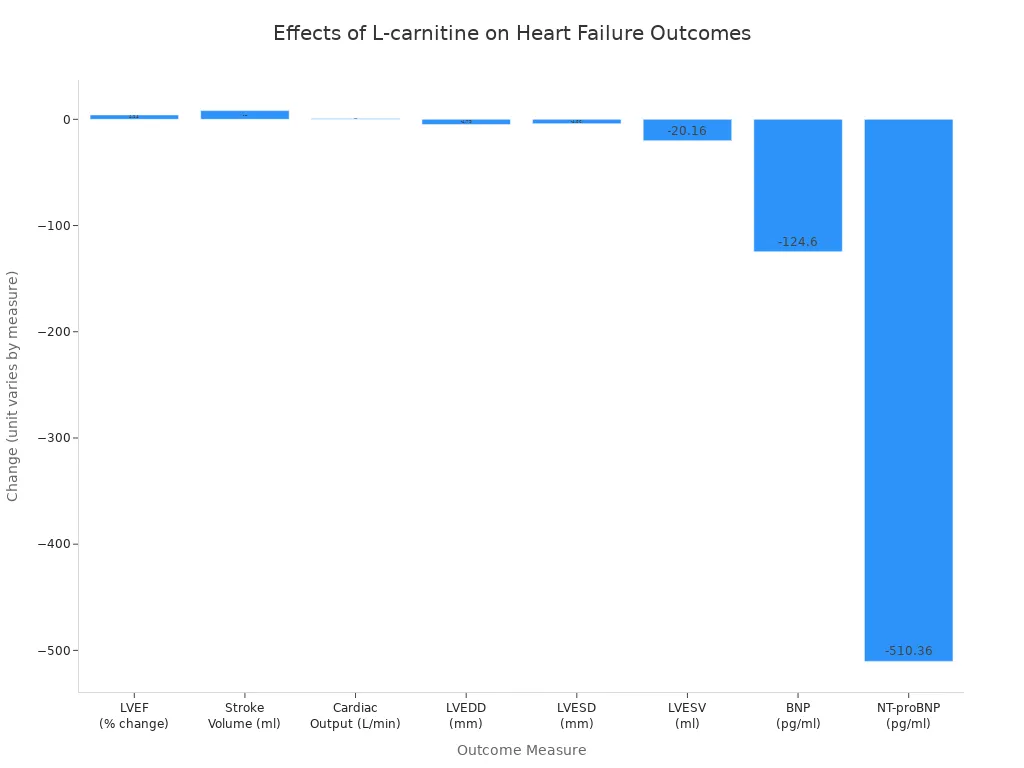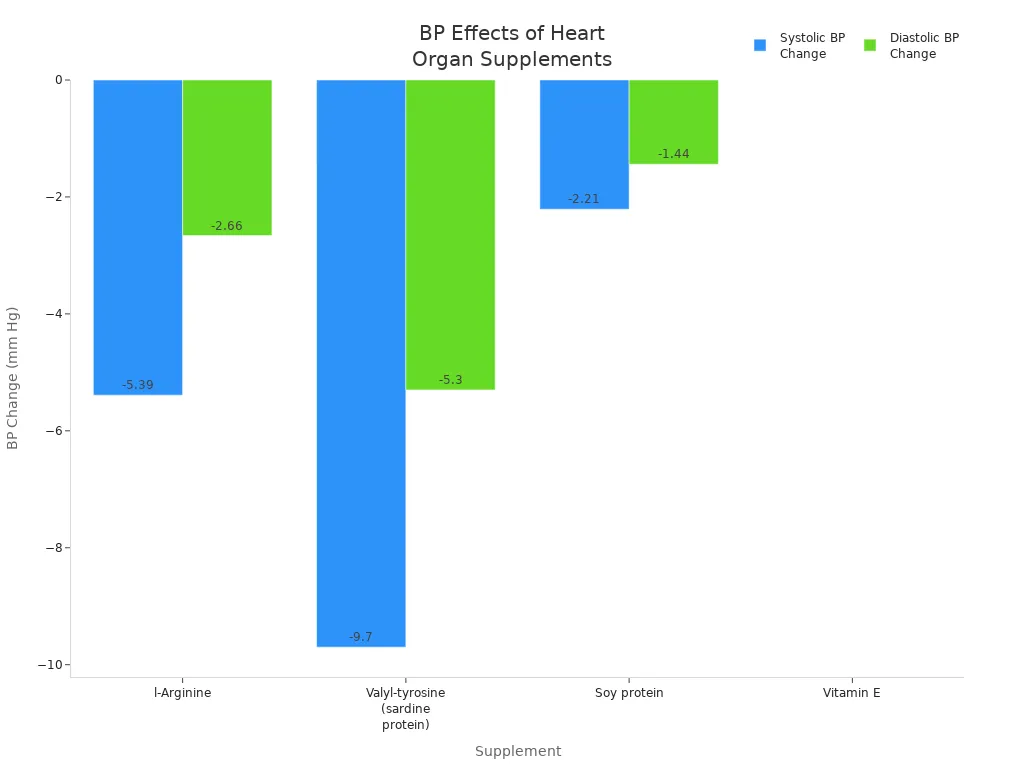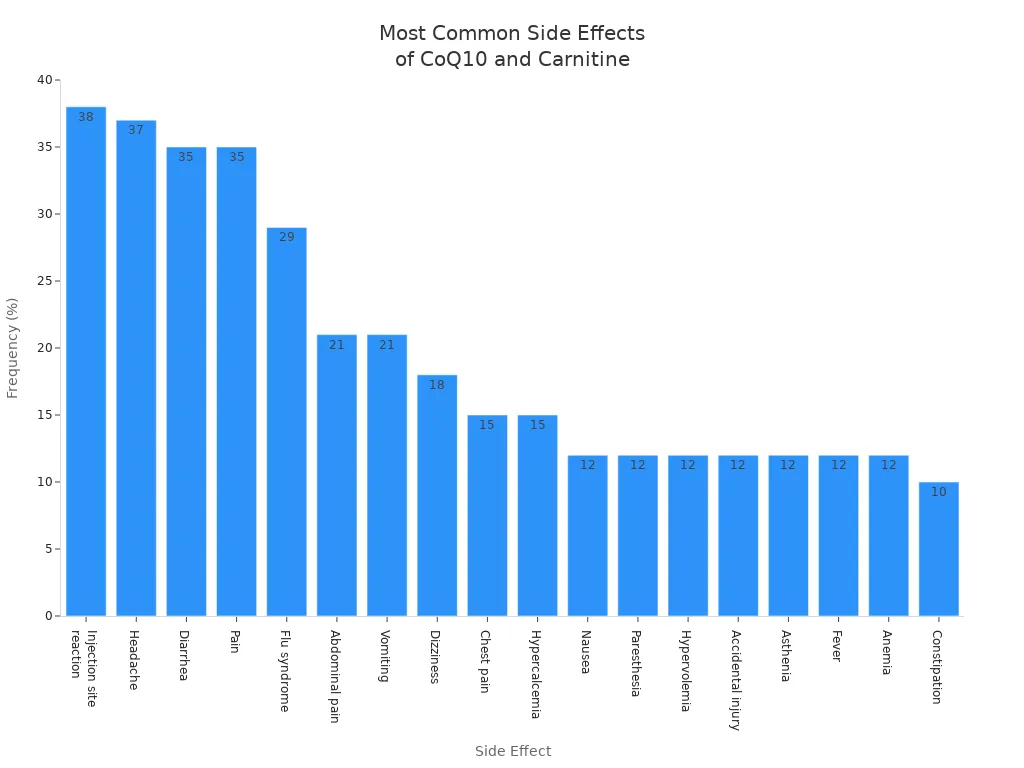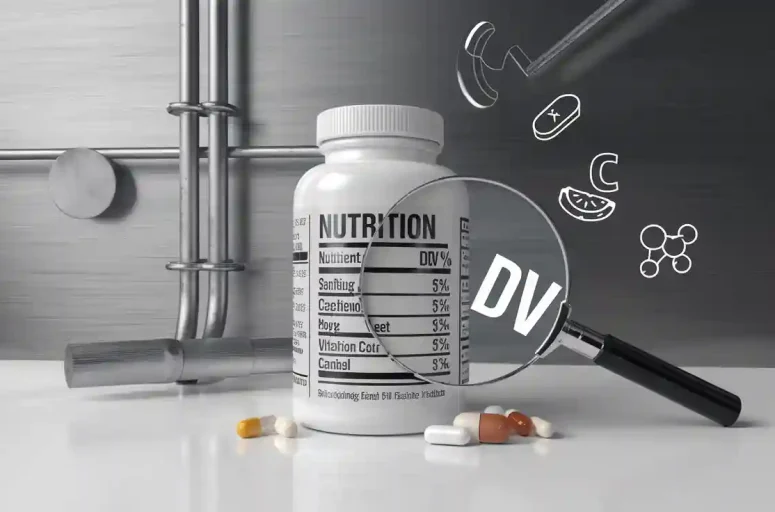
Research shows that heart organ supplements like coenzyme q10 and carnitine can support heart health in several ways. Coenzyme q10 improves heart function, raises HDL cholesterol, and reduces inflammation in people with heart disease. Both supplements protect the heart from oxidative stress and help maintain healthy blood pressure. Clinical studies reveal that coenzyme q10 and carnitine boost antioxidant levels and improve quality of life for those managing heart conditions. Anyone considering these supplements should talk with a healthcare provider to make the best choice for their health.
Key Takeaways
Coenzyme Q10 and carnitine help the heart by boosting energy production and protecting heart cells from damage.
These supplements may improve heart function, lower blood pressure, and reduce inflammation in people with heart conditions.
CoQ10 can ease muscle pain caused by statin medications, helping patients continue their treatment safely.
Heart organ supplements provide important nutrients that support overall heart health and energy levels.
People with heart failure, older adults, athletes, and statin users might benefit most from these supplements.
Most side effects are mild, like stomach upset or headache, but always check with a healthcare provider before starting.
Proper dosage and choosing high-quality products are key to getting the best results from CoQ10 and carnitine.
Supplements do not replace medications or a healthy lifestyle; always use them alongside medical advice and care.
Heart Organ Supplements Overview
What Are Heart Health Supplements
Heart health supplements include a wide range of products designed to support the cardiovascular system. Many of these supplements for heart health contain nutrients that play key roles in energy production, blood flow, and protection against oxidative stress. Heart organ supplements stand out because they use freeze-dried, ground, and encapsulated animal organs such as heart, liver, kidney, spleen, and pancreas. These supplements are often sourced from grass-fed or wild animals to ensure purity and high nutrient density.
Organ blends, like those made from venison or beef, provide a rich source of vitamins A, B12, K, and minerals such as iron and zinc. They also contain coenzyme Q10 (CoQ10), a powerful antioxidant that supports energy production in heart cells. The nutrients in these supplements are highly bioavailable, which means the body can absorb and use them efficiently. People who take heart organ supplements may notice improvements in energy, immune function, and overall vitality.
Other common heart health supplements include omega-3 fatty acids, fiber, magnesium, and red yeast rice. Each ingredient offers unique benefits for the heart. The table below highlights some main ingredients and their roles:
Ingredient | Role in Heart Health | Additional Notes and Risks |
|---|---|---|
Coenzyme Q10 | Supports energy production, acts as antioxidant | May help with heart failure and statin side effects |
Omega-3 Fatty Acids | Lowers triglycerides, supports heart disease prevention | Found in fish oil and some plants |
Fiber | Lowers LDL cholesterol, reduces blood pressure and inflammation | Best from whole foods; supplements can help if diet is lacking |
Magnesium | Supports heart rhythm and muscle function | Low levels linked to increased risk of heart disease |
Red Yeast Rice | Lowers cholesterol by inhibiting its production | May have side effects similar to statins; quality varies |
Why the Heart Needs Support
The heart works nonstop to pump blood and deliver oxygen throughout the body. Over time, factors like aging, poor diet, stress, and lack of exercise can weaken the heart and increase the risk of disease. Many people do not get enough essential nutrients from their diets, which can affect heart function and overall health.
Dietary supplements can help fill these nutritional gaps. Heart organ supplements provide concentrated sources of nutrients that support energy production, immune health, and cardiovascular function. Vitamins and minerals such as magnesium, niacin, vitamin A, vitamin K, and CoQ10 play important roles in maintaining a healthy heart. For example, magnesium helps regulate heart rhythm, while vitamin K supports blood vessel health.
People with higher risk factors for heart disease, such as older adults or those with a family history of cardiovascular problems, may benefit from targeted supplementation. Supplements for heart health can also support recovery after illness or intense physical activity. By providing the body with the right nutrients, these products help maintain heart strength and resilience.
Note: Not all supplements are suitable for everyone. Individuals should consult a healthcare provider before starting any new dietary supplements, especially if they have existing health conditions or take medications.
Coenzyme Q10 and Carnitine Explained
Coenzyme Q10 Basics
Coenzyme q10 plays a vital role in the metabolic processes of the heart. This compound, also known as coq10, is found in high concentrations in cardiac cells. The role of coq10 centers on supporting energy production and protecting the heart from damage. Manufacturers produce coenzyme q10 for supplements mainly through microbial fermentation, which uses bacteria and yeast to create a pure and active form. This method ensures high product quality and effectiveness for heart health.
Energy Production in the Heart
The heart needs a constant supply of energy to maintain its pumping action. Coenzyme q10 is essential for mitochondrial oxidative phosphorylation, which produces ATP, the main energy source for cardiac muscle contraction. Cardiac cells contain large amounts of coq10 because of their high energy demand. The role of coq10 in energy production supports the function of sodium–potassium ATPase and calcium-dependent ion channels, both crucial for proper cardiac function. When coq10 levels drop, the risk of heart failure and other cardiac problems increases. Supplementing with coenzyme q10 can improve cellular bioenergetics, raise high-energy phosphate concentrations, and support the heart during metabolic disease or failure.
Antioxidant Role
Coenzyme q10 also acts as a powerful antioxidant in the heart. It scavenges free radicals and reduces oxidative stress, which can damage cardiac cells and lead to heart failure. The role of coq10 includes stabilizing cell membranes and preventing the oxidation of LDL cholesterol. These effects help lower inflammation and protect against ischemia and reperfusion injury. By reducing proinflammatory cytokines, coq10 supports overall cardiac function and quality of life for people with heart failure.
Carnitine Basics
L-carnitine is another key nutrient for heart health. This compound supports metabolic processes by transporting long-chain fatty acids into the mitochondria, where they are broken down for energy. The heart relies on l-carnitine to maintain efficient energy production and prevent toxic buildup of fatty acids. Without enough l-carnitine, the heart may experience energy deficits, leading to cardiac failure and metabolic disease.
Fat Metabolism and Energy
L-carnitine enables the heart to use fat as a major energy source. It moves fatty acids into the mitochondria for beta-oxidation, which generates ATP. This process is vital for meeting the high energy needs of cardiac muscle. L-carnitine also helps export excess acyl groups from the mitochondria, keeping metabolic balance and preventing lipid accumulation. These actions support mitochondrial function, reduce oxidative stress, and protect the heart from failure.
Types of Carnitine
Several forms of carnitine exist, each with unique effects on cardiac function:
Compound | Heart Health Benefits | Dosage & Notes |
|---|---|---|
L-carnitine | Transports fats for heart energy, reduces damage after heart attack, improves function in heart failure, increases exercise capacity | 2-6 grams daily in trials; 500 mg 2-3 times/day for heart failure under supervision |
Acetyl-L-carnitine | Source of l-carnitine, supports metabolic processes, less specific data for heart health | Available as supplement; less specific heart health data |
Greater affinity for cardiac muscle, improves function in heart failure, enhances walking distance in vascular disease | Used in studies starting at 1 gram/day, increasing to 3 grams/day; promising for ischemic conditions |
Propionyl-l-carnitine, in particular, shows strong effects in improving heart function and quality of life for people with heart failure. Each type of l-carnitine supports metabolic health and helps the heart meet its energy demands, especially during metabolic disease or cardiac failure.
Cardiovascular Benefits of CoQ10 and Carnitine

Heart Failure Support
Heart failure affects millions of people worldwide and often leads to reduced cardiac function and poor quality of life. Coenzyme q10 and carnitine play important roles in supporting cardiovascular health, especially in chronic heart failure. Researchers have studied the effects of coenzyme q10 supplementation in heart failure patients. A meta-analysis of 32 randomized controlled trials with 3,763 participants found that coenzyme q10 improved clinical outcomes when used alongside standard therapy. Patients experienced increased left ventricular ejection fraction, which means better cardiac function and pumping ability. The beneficial effects of coq10 included reductions in all-cause mortality and fewer hospitalizations for heart failure. Improvements also appeared in New York Heart Association classification and exercise capacity, although some differences existed between studies. The safety profile of coenzyme q10 was acceptable, with no significant increase in adverse events.
L-carnitine also shows positive effects in heart failure management. Studies report that l-carnitine supplementation increases left ventricular ejection fraction by 4.14%, stroke volume by 8.21 ml, and cardiac output by 0.88 L/min. Patients had lower left ventricular end-diastolic and end-systolic diameters, which means less strain on the heart. Biomarkers such as brain natriuretic peptide and NT-proBNP decreased, indicating reduced severity of heart failure. However, l-carnitine did not significantly reduce mortality or improve exercise capacity in these studies. The table below summarizes the effects of l-carnitine supplementation in heart failure patients:
Outcome Measure | Effect of L-carnitine Supplementation | Statistical Significance |
|---|---|---|
Left Ventricular Ejection Fraction (LVEF) | Increased by 4.14% (Weighted Mean Difference) | P = 0.01 |
Stroke Volume (SV) | Increased by 8.21 ml | P = 0.01 |
Cardiac Output (CO) | Increased by 0.88 L/min | P < 0.01 |
LV End-Diastolic Diameter (LVEDD) | Decreased by 4.79 mm | P < 0.01 |
LV End-Systolic Diameter (LVESD) | Decreased by 4.06 mm | P < 0.01 |
LV End-Systolic Volume (LVESV) | Decreased by 20.16 ml | P < 0.01 |
Brain Natriuretic Peptide (BNP) | Decreased by 124.60 pg/ml | P = 0.01 |
NT-proBNP | Decreased by 510.36 pg/ml | P < 0.01 |
All-cause Mortality | No significant difference | P = 0.07 |
Six-minute Walk Test | No significant difference | P = 0.14 |

Both coenzyme q10 and carnitine support metabolic processes in cardiac cells. They help maintain energy production and reduce oxidative stress, which protects the heart from further damage. These effects contribute to better cardiovascular outcomes and improved quality of life for people living with chronic heart failure.
Blood Pressure and Circulation
Blood pressure control is essential for cardiovascular health. Coenzyme q10 has demonstrated blood pressure-lowering effects in clinical trials. It works through antioxidant and anti-inflammatory actions, improves endothelial nitric oxide synthase activity, and enhances vascular smooth muscle function. These effects help reduce arterial stiffness and improve circulation. Studies show that coenzyme q10 supplementation can lower both systolic and diastolic blood pressure in patients with essential hypertension. The optimal dose for this effect ranges from 100 to 200 mg per day. More pronounced benefits appear in patients with diabetes and dyslipidemia, especially in studies lasting longer than 12 weeks. The reduction in systolic blood pressure averages about 4.77 mmHg. Coenzyme q10 also protects against oxidative and nitrative stress, which helps restore endothelial nitric oxide synthase function and supports blood pressure regulation.
Researchers have found that coenzyme q10 improves vascular circulation by enhancing endothelial function and vascular smooth muscle activity. Clinical trials show better flow-mediated dilation and endothelial function in patients with type 2 diabetes, coronary artery disease, heart failure, and peripheral artery disease. Coenzyme q10 increases nitric oxide bioavailability, which is critical for vascular tone and healthy circulation. In heart failure patients, coenzyme q10 treatment for three months improved peripheral endothelial function and reduced oxidized LDL levels. An analogue of coenzyme q10 called MitoQ improved brachial artery endothelial function in peripheral artery disease patients, likely by increasing antioxidant defenses and reducing mitochondrial-derived reactive oxygen species. Coenzyme q10 supports mitochondrial function in vascular tissues, which controls reactive oxygen species production and nitric oxide availability. These effects help maintain cardiovascular health and protect against complications.
No clinical data currently support carnitine’s influence on vascular circulation in humans. However, carnitine remains important for metabolic processes and energy production in cardiac cells, which indirectly supports cardiovascular function.
Recovery and Exercise Performance
Physical activity and exercise place high demands on the heart and cardiovascular system. Coenzyme q10 and carnitine help improve exercise performance and recovery, especially in cardiac patients and athletes. Coenzyme q10 enhances mitochondrial energy production, provides antioxidant protection, and reduces inflammation. Studies show that coenzyme q10 supplementation in trained athletes and untrained individuals improves aerobic power, anaerobic threshold, exercise performance, and recovery. It also reduces exercise-induced muscle damage and inflammation in some cases. For example, adolescent swimmers taking coenzyme q10 had increased blood levels of the compound, which correlated with higher VO2max. Elite athletes such as kendo practitioners experienced reduced creatine kinase and myoglobin levels, suggesting less muscle damage and inflammation.
The table below highlights key findings from research on coenzyme q10 and carnitine for exercise performance and recovery:
Supplement | Population/Subjects | Dosage | Duration | Key Findings |
|---|---|---|---|---|
Coenzyme q10 | Trained athletes and untrained individuals | 100-300 mg/day | 2-6 weeks | Improved aerobic power, anaerobic threshold, exercise performance, and recovery; reduced muscle damage and inflammation |
Coenzyme q10 | Male adolescent swimmers | 100 mg/day | 28 days | Increased blood coenzyme q10 levels correlated with VO2max |
Coenzyme q10 | Elite athletes (kendo) | 300 mg/day | 2 weeks | Increased blood coenzyme q10, reduced muscle damage and inflammation |
Coenzyme q10 | Heart failure and coronary heart disease patients | ≥200 mg/day | Clinical use | Preserved heart health and improved mitochondrial function |
L-carnitine | Coronary artery disease patients | 1000 mg/day | 12 weeks | Reduced inflammation markers and increased antioxidant enzyme activities |
A 12-week trial in coronary artery disease patients showed that l-carnitine supplementation reduced inflammation markers such as C-reactive protein, interleukin-6, and tumor necrosis factor-alpha. It also increased antioxidant enzyme activities, which means less oxidative stress and better recovery after exercise. These effects help cardiac patients and athletes maintain cardiovascular health and improve quality of life.
Research supports the use of coenzyme q10 and carnitine for improving some physical performance indices, antioxidant capacity, and immune modulation. However, results in athletes and physically active individuals remain inconsistent. The effects depend on exercise type, intensity, and supplementation regimen. Some studies show improved physical performance and reduced muscle damage, while others find no significant benefits. Combining coenzyme q10 with other nutrients or carnitine may enhance cardiovascular function and quality of life in chronic heart failure patients.
Statin Side Effect Relief
Statins help lower cholesterol and reduce the risk of cardiovascular disease, but many people experience muscle pain or weakness as a side effect. These symptoms can lead to poor adherence or discontinuation, which increases the risk of heart failure and other cardiovascular problems. Researchers have investigated whether coenzyme q10 and carnitine can relieve these side effects and improve quality of life for patients who need statin therapy.
Coenzyme q10 plays a key role in mitochondrial energy production. Statins can lower coenzyme q10 levels in muscle cells, which may contribute to muscle pain and weakness. Several clinical studies have examined the effects of coenzyme q10 supplementation in people with statin-induced muscle symptoms. The table below summarizes major research findings:
Study (Author, Year) | Study Type | Sample Size | Intervention | Outcome |
|---|---|---|---|---|
Qua et al. (2018) | Meta-analysis of 12 RCTs | 575 | CoQ10 supplementation with statins | Significant reduction in statin-induced myopathy symptoms; improved statin tolerance |
Derosa et al. (2019) | Double-blind RCT | 60 | 100 mg/day CoQ10 + half-dose statin for 3 months | Improvement in myalgia and muscle pain compared to placebo |
Skarlovnik et al. (2014) | Randomized clinical study | 50 | 50 mg CoQ10 twice daily for 30 days | Reduced pain severity and interference scores vs placebo |
Zlatohlavek et al. (2012) | Observational study | 28 | CoQ10 supplementation for 3 and 6 months | Significant improvement in muscle pain and weakness scores |
2021 RCT | Randomized controlled trial | N/A | CoQ10 supplementation for 12 weeks in statin-intolerant patients | Steady improvement in muscle symptoms and increased statin adherence |
A randomized controlled trial with 50 patients who had mild-to-moderate muscle pain from statins tested coenzyme q10 at 50 mg twice daily for 30 days. The group taking coenzyme q10 reported a 33% decrease in pain severity and a 40% reduction in pain interference with daily activities compared to placebo. No changes in liver or muscle enzymes appeared, and cholesterol levels remained stable. These results suggest that coenzyme q10 can relieve muscle symptoms by supporting mitochondrial function and reducing the negative effects of statin therapy. Improved statin tolerance helps patients continue treatment, which lowers the risk of heart failure and cardiovascular events.
L-carnitine also shows promise for reducing muscle-related side effects from statins. Experimental studies in animal models demonstrate that l-carnitine acts as a free radical scavenger and protects mitochondria from statin-induced damage. It inhibits muscle atrophy pathways, such as the ubiquitin-proteasome system, and lowers the expression of muscle atrophy markers. These effects help maintain muscle health and energy metabolism, which are important for people with heart failure or those at risk of cardiovascular disease. However, l-carnitine does not prevent all statin side effects. For example, it does not correct slowed heart rate or reduced movement seen in some animal studies. While l-carnitine supports muscle function and reduces oxidative stress, more research is needed to confirm its benefits in humans with statin-induced muscle symptoms.
Note: Patients who experience muscle pain or weakness while taking statins should consult a healthcare provider before starting any supplement. Coenzyme q10 and carnitine may help relieve some side effects, but individual responses vary. Proper management of statin therapy remains essential for preventing heart failure and improving cardiovascular outcomes.
Scientific Evidence for Heart Health Supplements
Major Clinical Studies
Researchers have conducted many randomized controlled trials to evaluate the effects of coenzyme q10 and carnitine on cardiac function and cardiovascular disease outcomes. Most studies investigating coenzyme q10 for ischemic heart disease and heart failure have involved small or moderate groups of patients. For example, a placebo-controlled trial with 73 post-myocardial infarction patients found that 120 mg/day coenzyme q10 reduced total cardiac events, including nonfatal myocardial infarctions and cardiac deaths, after one year. Other trials and a meta-analysis from 1997 reported improvements in congestive heart failure symptoms, such as reduced hospitalization, less dyspnea, and less edema. However, only two of fourteen trials included more than 25 participants, which limits the strength of the conclusions.
Recent studies using advanced measures of cardiac function have shown mixed results. Some found no significant benefit of coenzyme q10 alone on ejection fraction or exercise capacity in patients with cardiovascular disease. One trial combined coenzyme q10 with carnitine and taurine, reporting modest clinical improvement in patients with congestive heart failure. Researchers have planned a large multinational trial (Q-symbio) with over 500 patients who have NYHA class III and IV heart failure. This trial aims to provide more definitive evidence about the effects of coenzyme q10 on cardiac outcomes and quality of life.
Meta-analyses have reviewed the efficacy of heart organ supplements for cardiovascular disease prevention. A comprehensive review of 50 randomized controlled trials, including nearly 295,000 participants, found no evidence that vitamin and antioxidant supplements reduce the risk of major cardiovascular events. Subgroup analyses by supplement type, cardiovascular outcome, and study design showed no beneficial effects. Some marginal benefits for vitamin B6 and vitamin E appeared only in trials funded by the pharmaceutical industry and disappeared in high-quality studies. Other meta-analyses reported no benefit or even potential harm, such as increased mortality with β carotene. Overall, these findings suggest that vitamin and antioxidant supplements do not lower the risk of cardiovascular disease or improve cardiac health.
Study Type | Population Size | Supplement(s) | Main Effects Observed |
|---|---|---|---|
RCT | 73 | Coenzyme q10 | Reduced cardiac events after MI |
Meta-analysis | ~295,000 | Vitamins/Antioxidants | No reduction in cardiovascular disease |
RCT (combination) | Small | Coenzyme q10 + Carnitine + Taurine | Modest improvement in CHF |
Expert Recommendations
Leading cardiology organizations, such as the American Heart Association and American College of Cardiology, define heart failure and cardiovascular disease but do not recommend routine coenzyme q10 or carnitine supplementation in their formal guidelines. Clinical evidence, including the Q-SYMBIO trial, shows that coenzyme q10 supplementation at 300 mg/day in patients with moderate to severe heart failure can reduce major adverse cardiac events and improve clinical outcomes. Coenzyme q10 is recognized for its antioxidant and anti-inflammatory effects, with a good safety profile even at high doses and in vulnerable populations.
Studies suggest that coenzyme q10 deficiency correlates with heart failure severity. Supplementation may improve symptoms and cardiac function in patients with cardiomyopathies and ischemic heart disease. Combined supplementation of coenzyme q10 and carnitine has shown protective effects against oxidative stress and improved cardiac function in drug-induced cardiomyopathies. However, experts agree that more large-scale trials are needed to confirm these effects and clarify the role of these supplements in cardiovascular disease management.
Note: Leading organizations have not issued formal recommendations endorsing routine coenzyme q10 or carnitine supplementation for cardiovascular disease or ischemic heart disease. Patients should consult a healthcare provider before starting any new supplement to ensure safety and effectiveness for their cardiac and metabolic health.
Who Should Consider Heart Organ Supplements
Older Adults
Older adults face a higher risk of heart failure due to age-related changes in the cardiovascular system. Many experience reduced cardiac function, increased blood pressure, and a greater chance of developing chronic heart failure. Supplements such as taurine, omega-3 fatty acids, and certain organ-based nutrients have shown promise for this group. Taurine, found in high amounts in the heart, has improved cardiac function and reduced blood pressure in both animal and human studies. In Japan, taurine has been approved for heart failure treatment since 1985, highlighting its clinical value for older adults.
Large clinical trials provide mixed results for other supplements. The VITAL trial, which included nearly 26,000 adults aged 50 and older, found that omega-3 supplements did not lower the overall rate of major cardiovascular events. However, some groups benefited more. Those with low fish intake saw a 19% reduction in major events, and African American participants had up to a 77% reduction in heart attacks. The REDUCE-IT trial also showed that high-dose prescription omega-3 reduced major cardiovascular events by 25% in high-risk patients. These results suggest that older adults with specific risk factors may benefit from targeted supplementation.
On the other hand, the Physicians’ Health Study II found that long-term multivitamin use did not reduce the risk of heart failure or death in older adults, even among those with poor diets. This suggests that not all supplements are effective for cardiovascular health in this population.
Note: Older adults should consult a healthcare provider before starting any supplement, especially if they have chronic heart failure or take multiple medications.
People with Heart Failure
People diagnosed with heart failure, including chronic heart failure, often seek ways to improve symptoms and quality of life. Several supplements have been studied for their effects on heart failure:
Coenzyme Q10 may improve heart failure class, symptoms, and quality of life. Some small studies show positive results, but larger trials are needed.
Hawthorn can increase exercise tolerance and improve symptoms, but it may interact with medications and has some risks.
Thiamine (Vitamin B1) may help those with a deficiency, but routine use is not broadly supported.
Vitamin C and Vitamin D show mixed results. Vitamin C may lower heart failure risk, while Vitamin D may improve inflammation and ejection fraction in some cases.
Yoga and tai chi are safe adjuncts that can improve exercise tolerance and quality of life.
Coenzyme Q10 supplementation stands out for its benefits in heart failure. Randomized controlled trials show that it can reduce mortality by about 31%, improve exercise capacity, and increase ejection fraction by an average of 3.7%. It also lowers adverse cardiac events and hospitalizations. The Q-SYMBIO trial found that coenzyme Q10 significantly improved survival and reduced hospitalizations in patients with severe heart failure.
Omega-3 fatty acids from fish oil reduce inflammation, oxidative stress, and the risk of thrombosis. High intake is linked to a 16% lower risk of heart failure and fewer hospitalizations. Doses above 1,000 mg daily improve left ventricular ejection fraction.
L-carnitine supplementation improves cardiac efficiency, exercise capacity, and left ventricular ejection fraction. It also reduces oxidative stress and inflammation, protecting against ventricular dysfunction and arrhythmias. Hawthorn extracts may help with symptoms like fatigue.
Patients with heart failure should always discuss supplement use with their healthcare team to avoid interactions and ensure safety.
Statin Users
Statin medications lower cholesterol and reduce the risk of heart failure, but many users experience muscle pain or weakness. These side effects are the most common reason for stopping statin therapy, which can increase the risk of heart failure. Over 20% of adults above 40 in some countries use statins. The prevalence of muscle side effects varies, ranging from mild discomfort to severe muscle breakdown.
Some studies suggest that coenzyme Q10 and l-carnitine supplementation may help reduce muscle symptoms in statin users. However, research results are mixed. Some trials report no effect, while others show symptom reduction. The scientific community continues to debate the benefits of these supplements for statin-induced muscle pain. In the United States, about 1.3% of adults used coenzyme Q10 supplements in 2012, but this figure does not reflect statin users specifically.
Aspect | Summary |
|---|---|
Statin Use Prevalence | |
Muscle Side Effects | Most frequent cause of discontinuation; range from mild to severe |
CoQ10/Carnitine Efficacy | Mixed results; ongoing debate |
CoQ10 Use in US Adults | 1.3% in 2012 (not statin-specific) |
Statin users should consult their healthcare provider before starting any supplement, especially if they have a history of heart failure or chronic heart failure.
Athletes and Active People
Athletes and physically active individuals often seek ways to improve performance and speed up recovery. Supplements such as coenzyme Q10 and carnitine have gained attention for their potential to support energy production and reduce muscle fatigue. Coenzyme Q10 helps cells produce energy more efficiently, which can benefit those who train regularly. Studies show that athletes who take coenzyme Q10 may experience better aerobic capacity and less muscle damage after intense exercise.
Carnitine plays a role in transporting fatty acids into cells, where they are used for energy. This process helps reduce the buildup of waste products that can cause muscle soreness. Some research suggests that carnitine supplementation can lower inflammation markers and increase antioxidant activity. These effects may help athletes recover faster and maintain endurance during long workouts.
Active people who push their bodies to the limit may also benefit from improved blood flow and reduced oxidative stress. Coenzyme Q10 and carnitine support these processes, which can lead to better overall performance. However, results vary depending on the type of exercise and individual response. Athletes should consult a healthcare provider before starting any new supplement to ensure safety and effectiveness.
Tip: Athletes should focus on a balanced diet and proper hydration. Supplements may help, but they cannot replace healthy lifestyle habits.
Chemotherapy Patients
Chemotherapy can cause damage to healthy cells, including those in the cardiovascular system. Some patients experience fatigue, muscle weakness, and reduced energy levels during treatment. Coenzyme Q10 and carnitine may offer support by helping cells produce energy and protecting against oxidative stress.
Research indicates that coenzyme Q10 can reduce some side effects of chemotherapy, such as fatigue and muscle pain. Carnitine may help prevent muscle wasting and improve energy levels. These supplements support mitochondrial function, which is important for cell health during chemotherapy.
Patients undergoing chemotherapy should speak with their healthcare team before using any supplement. Some supplements can interact with medications or affect treatment outcomes. Medical professionals can provide guidance based on individual needs and health status.
High Blood Pressure
High blood pressure, or hypertension, affects many adults and increases the risk of cardiovascular problems. Several supplements have shown promise in helping manage blood pressure. Clinical studies have examined the effects of l-arginine, valyl-tyrosine, soy protein, beetroot juice, l-carnitine, and vitamin E.
The table below summarizes findings from recent research:
Supplement | Study Type | Dosage/Duration | Blood Pressure Effect (mm Hg) | Notes |
|---|---|---|---|---|
l-Arginine | Meta-analysis (11 trials) | 4 g/d to 24 g/d, 4 weeks | -5.39 systolic / -2.66 diastolic | Significant reduction; safe short-term |
Valyl-tyrosine (sardine protein) | RCT (29 patients) | 3 mg, 4 weeks | -9.7 systolic / -5.3 diastolic | Natural ACE inhibitor; notable effect |
Soy protein | Observational + RCTs | ≥25 g/d, 3 years | -1.9 to -4.9 systolic / -0.9 to -2.2 diastolic | Mixed results; modest reduction |
Beetroot juice | Clinical studies | 500 mg/d | Lowers BP; improves blood flow | Works via nitrate/nitrite pathway |
l-Carnitine | Clinical studies | N/A | Reduces oxidative stress and BP | Supports NO production and defense |
Vitamin E | Multiple studies | Various | Little to no reduction | Possible interactions; small or no effect |

A systematic review found that phenolic-rich supplements, including beetroot juice and resveratrol, can help lower blood pressure in adults. Dietary changes like the DASH diet and nitrate-rich foods also show positive effects. However, long-term benefits and the exact impact of these supplements need more research.
Note: People with high blood pressure should always consult a healthcare provider before starting any supplement. Some products may interact with medications or cause unwanted side effects.
Safety and Side Effects
Common Side Effects
Coenzyme Q10 and carnitine supplements are generally well tolerated. Most people experience only mild side effects, which usually affect the digestive system. In clinical trials, constipation and stomach ache occurred more often in those taking these supplements compared to placebo. About 10% of participants reported these symptoms, while only 3% in the placebo group had similar complaints. Other studies found that gastrointestinal issues such as diarrhea, abdominal pain, vomiting, and nausea are the most frequently reported side effects. Headache and dizziness also appear in some cases.
The following table summarizes the most common side effects:
Side Effect Category | Side Effects (Frequency) |
|---|---|
Gastrointestinal | Diarrhea (35%), Abdominal pain (21%), Vomiting (21%), Nausea (12%), Constipation (1-10%) |
Nervous System | Headache (37%), Dizziness (18%), Paresthesia (12%) |
Metabolic | Hypercalcemia (15%), Hypervolemia (12%) |
Other | Pain (35%), Flu syndrome (29%), Chest pain (15%), Accidental injury (12%), Asthenia (12%), Fever (12%) |
Local | Injection site reaction (38%) |
Hematologic | Anemia (12%) |

Most side effects are mild and temporary. CoQ10 may cause stomach upset, abdominal pain, nausea, and heartburn. Rarely, people report insomnia at higher doses or elevated liver enzymes when taking more than 300 mg per day. In a large study with over 2,600 patients, only about 1% reported side effects, mainly abdominal pain and nausea. Serious reactions are very uncommon.
Tip: If side effects persist or worsen, individuals should stop the supplement and consult a healthcare provider.
Drug Interactions
Coenzyme Q10 and carnitine do not have known interactions with each other. No alcohol or food interactions have been identified for these supplements. No therapeutic duplication warnings exist between CoQ10 and carnitine. Both supplements may interact with other medications, but none specifically between each other.
No reported drug interactions between CoQ10 and carnitine.
No known alcohol or food interactions.
No therapeutic duplication warnings.
Both may interact with other drugs, but not with each other.
The absence of reported interactions does not guarantee safety for everyone. People taking prescription medications should always check with their healthcare provider before starting new supplements.
TMAO and Atherosclerosis Risk
Scientists have studied the link between l-carnitine supplementation and trimethylamine N-oxide (TMAO) levels. TMAO is a compound that some studies associate with cardiovascular disease and atherosclerosis. L-carnitine increases TMAO levels, but the relationship between TMAO and heart disease risk is complex. L-carnitine may protect the heart by reducing inflammation and oxidative stress, even though TMAO levels rise. Some research shows that l-carnitine improves lipid profiles and does not worsen markers of inflammation or oxidative stress.
The connection between TMAO and cardiovascular risk is not straightforward. For example, fish is high in TMAO but is considered heart-healthy. Scientists continue to investigate how TMAO affects the body and whether l-carnitine supplementation increases risk. Current evidence suggests that higher TMAO from l-carnitine does not automatically mean greater risk for atherosclerosis. More research is needed to understand these mechanisms and their impact on health.
When to Avoid These Supplements
Some people should avoid coenzyme Q10 and carnitine supplements. Certain health conditions and situations increase the risk of side effects or complications. Individuals with allergies to any ingredient in these supplements should not take them. People with severe kidney disease may experience problems because carnitine can build up in the body. Those with liver disease should also use caution, as the body processes these supplements through the liver.
Pregnant or breastfeeding women should avoid these supplements unless a healthcare provider recommends them. There is not enough research to confirm their safety during pregnancy or while nursing. Children should not take these supplements unless prescribed by a doctor.
People who take blood-thinning medications, such as warfarin, should be careful. Coenzyme Q10 may reduce the effectiveness of these drugs. Those with a history of seizures should avoid carnitine, as it may increase the risk of having a seizure. Anyone scheduled for surgery should stop taking these supplements at least two weeks before the procedure. Supplements can affect anesthesia and increase bleeding risk.
Tip: Always read supplement labels carefully. Look for warnings about allergies, drug interactions, and special precautions.
A summary table helps identify when to avoid these supplements:
Situation or Condition | Recommendation |
|---|---|
Severe kidney disease | Avoid carnitine |
Liver disease | Use caution |
Pregnancy or breastfeeding | Avoid unless prescribed |
Children | Avoid unless prescribed |
Blood-thinning medication | Use caution with CoQ10 |
History of seizures | Avoid carnitine |
Upcoming surgery | Stop supplements 2 weeks prior |
Allergies to ingredients | Avoid both supplements |
Consulting a Healthcare Provider
Before starting any new supplement, people should talk with a healthcare provider. Doctors and pharmacists can help decide if coenzyme Q10 or carnitine are safe and appropriate. They can review a person’s medical history, current medications, and possible allergies. This step helps prevent harmful interactions and side effects.
A healthcare provider can also recommend the right dosage and form of supplement. They may suggest blood tests to check for nutrient deficiencies or monitor for side effects. People with chronic illnesses, such as diabetes or high blood pressure, need extra guidance. Supplements can affect how the body responds to other treatments.
Note: Never replace prescribed medication with supplements without medical advice.
If someone experiences new symptoms after starting a supplement, they should contact their healthcare provider right away. Signs like severe stomach pain, rash, trouble breathing, or swelling need immediate attention. Regular check-ins with a doctor help ensure safe and effective use of supplements.
How to Use Heart Health Supplements Safely
Dosage Guidelines
Proper dosage plays a key role in the safe administration of coq10 and other heart health supplements. Most clinical studies recommend a daily intake of coenzyme q10 ranging from 100 mg to 300 mg. The administration of coq10 often starts at a lower dose, then increases based on individual needs and medical advice. Some patients with heart failure or those taking statins may require higher doses, but only under supervision. The administration of coq10 should be consistent, as regular intake helps maintain stable blood levels. L-carnitine dosages vary, with typical amounts between 500 mg and 2,000 mg per day. The administration of coq10 and l-carnitine together may offer added benefits for certain individuals, but a healthcare provider should guide this process.
Tip: Always follow the dosage instructions on the supplement label or those provided by a healthcare professional. Never exceed the recommended dose without medical approval.
Supplement | Typical Dosage Range | Notes on Administration |
|---|---|---|
Coenzyme q10 | 100–300 mg daily | Administration of coq10 should be divided into two doses for better absorption |
L-carnitine | 500–2,000 mg daily | Take with meals to improve absorption |
Choosing Quality Products
Selecting high-quality supplements ensures safety and effectiveness. The administration of coq10 depends on the purity and potency of the product. Look for brands that use third-party testing to verify ingredient quality. The administration of coq10 from reputable sources reduces the risk of contamination and ensures accurate dosing. Products labeled as “USP Verified” or “NSF Certified” meet strict standards for purity. The administration of coq10 in the form of ubiquinol may offer better absorption for some people. Always check the expiration date and avoid products with unnecessary fillers or artificial additives.
Checklist for Choosing Supplements:
Check for third-party testing or certification.
Review ingredient list for purity.
Confirm the form of coenzyme q10 (ubiquinone or ubiquinol).
Avoid supplements with artificial colors or preservatives.
Choose brands with positive reviews and transparent sourcing.
Tips for Daily Use
Consistency supports the benefits of dietary supplements. The administration of coq10 works best when taken at the same time each day, preferably with food to enhance absorption. Store supplements in a cool, dry place away from sunlight. The administration of coq10 and l-carnitine should fit into a daily routine, such as with breakfast or dinner. Track supplement use with a journal or app to avoid missed doses. If side effects appear, stop the administration of coq10 and consult a healthcare provider. Regular check-ins with a doctor help monitor progress and adjust dosage if needed.
Note: Supplements support health but do not replace a balanced diet or prescribed medications. The administration of coq10 and other heart health products should always complement medical care.
CoQ10 and carnitine supplements may support energy, reduce muscle symptoms, and improve quality of life for some individuals. Potential risks include mild digestive issues and possible interactions with medications.
Always consult a healthcare provider before starting any supplement.
Readers should rely on scientific evidence and seek professional guidance. For those interested in supporting their well-being, consider regular checkups, balanced nutrition, and open conversations with medical experts.
FAQ
What is the best time to take CoQ10 and carnitine supplements?
Most people take CoQ10 and carnitine with meals to improve absorption. Morning or midday works well. Taking them at the same time each day helps maintain steady levels in the body.
Can CoQ10 and carnitine replace heart medications?
No, these supplements do not replace prescribed heart medications. They may support heart health, but only a healthcare provider can adjust or stop any medication. Always follow medical advice.
Are CoQ10 and carnitine safe for long-term use?
Studies show that both supplements are generally safe for long-term use when taken at recommended doses. Mild digestive side effects may occur. Regular check-ins with a healthcare provider help ensure ongoing safety.
Do these supplements interact with common medications?
CoQ10 may reduce the effectiveness of blood thinners like warfarin. Carnitine rarely interacts with medications. Always inform a healthcare provider about all supplements and medicines being used.
Who should avoid taking CoQ10 or carnitine?
People with severe kidney disease, liver disease, or a history of seizures should avoid these supplements. Pregnant or breastfeeding women and children should only use them under medical supervision.
Can athletes benefit from CoQ10 and carnitine?
Athletes may see improved energy and faster recovery with these supplements. Some studies show better exercise performance and less muscle soreness. Results vary based on individual response and training type.
How long does it take to notice benefits?
Some people notice benefits within a few weeks. For heart health or exercise performance, it may take up to three months of consistent use. Effects depend on individual health and supplement quality.
Do CoQ10 and carnitine increase TMAO levels?
Carnitine can raise TMAO levels, but the link to heart disease risk remains unclear. Fish also raises TMAO but is considered heart-healthy. More research is needed to understand this relationship.


